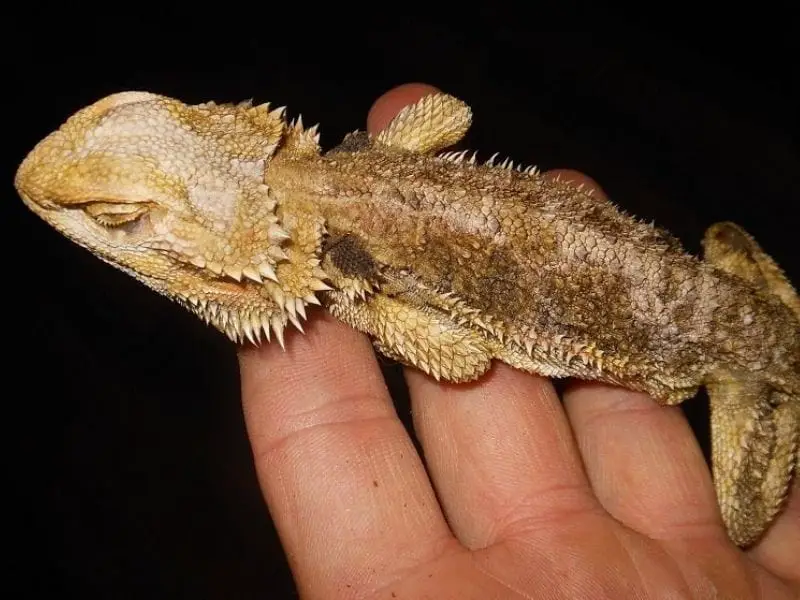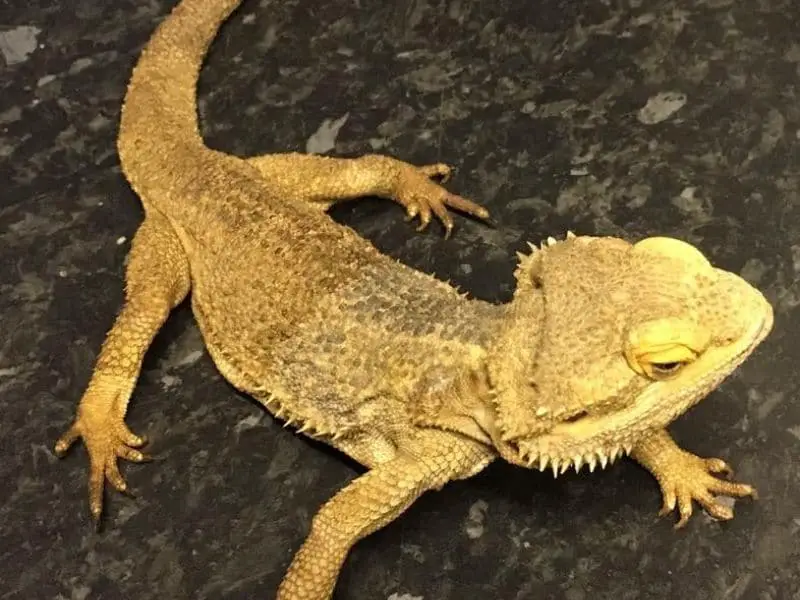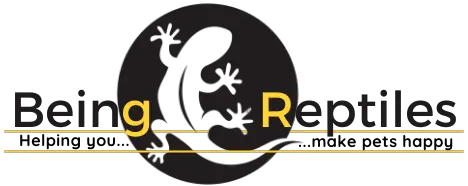It is easy to think that an underweight bearded dragon is not getting enough food, but many other reasons can make the lizard look so skinny. You want to make sure you identify the actual cause, which will guide you to the right fix.
An underweight bearded dragon will show signs such as a skinny tail, visible ribs, thin legs, and diminished fat pads. Being skinny is caused by a lack of food, diseases, or stress. Increase the frequency of feeding and the amount of fatty foods in their diet to help bearded dragons gain weight.
Signs of an underweight bearded dragon

It is quite easy to tell if a bearded dragon is underweight. The body shows signs of food deprivation, usually in areas where you’d expect to see pockets of fat stored as reserves for the brumation period.
Here are signs of an underweight bearded dragon you should look out for:
1. Skinny legs
When the body is malnourished, it’s common for signs to show up in the legs. The bones will be more visible and muscles may show signs of atrophy (wasting away of muscle mass).
In a normal or healthy bearded dragon, you’d expect to see some muscle mass on the arms and hind legs. Also, a healthy beardie will have some small amount of fat deposited around the legs and especially near the armpits.
2. Skinny tail
Although bearded dragons don’t store much fat in their tails like leopard geckos, a healthy bearded dragon will have a small amount of fat in its tail. You can tell by touching the tail and feeling the scanty squishy mass, especially at the base.
A too-thin tail is a sign that insufficient fat is stored elsewhere in the body. The tail will be bony to the feel, meaning the beardie has no fat reserves.
3. Visible hips and ribs
A healthy bearded dragon will have a visible hip bone with some fat surrounding it. Bones should not be protruding (as seen in an undernourished lizard). Bones like these are signs of severe undernourishment, meaning your beardie needs to be fixed as soon as possible.
4. Disproportionate head
A healthy bearded dragon usually has a relatively proportional head to the rest of its body. If your beardie’s head seems disproportionate to the rest of their body, then it’s time to get them some food! Usually, an underweight or skinny beardie will have a disproportionately large skull with too-large eyes that are sunken into the sockets and appear lifeless.
5. Sunken eyes
A healthy bearded dragon will have lively and alert eyes with a white, blue, or pink lid surrounding them. If the lids are sunken in and there is no color on the eye (brown spot), this may be a sign that the lizard is malnourished and is underweight.
The sunken eyes in Bearded dragons are not always a sign of being underweight; they may also indicate something wrong with their health. Extreme dehydration in lizards can also make the eye sockets appear large and the eyes sunken.
6. Sagging skin across the chest
Skinny bearded dragons can also show signs of being malnourished in their skin. When a lizard is skinny or underweight, the sagging usually occurs around the chest and neck, but other areas can also become loose.
A healthy and well-hydrated beardie will have some elasticity in its skin (especially near joints). If you notice your bearded dragon’s skin is very saggy, this could indicate that they are not getting enough food.
7. Diminished fat pads
The fat pads on a healthy bearded dragon’s body are usually proportionate to the animal. If these fat pads appear to be shrinking in size, this could be another sign of malnourishment and improper weight.
Fat pads on bearded dragons are a good indicator of the health status of the lizard. While big and prominent fat pads may be a sign of obesity, a lack of these pads on the head; can also mean your reptile is too skinny and may need proper nutrition to gain weight again.
READ ALSO: Overweight Bearded Dragon – Signs and Weight Loss Tips
Reasons why your bearded dragon is skinny
While malnutrition is one of the main reasons why a bearded dragon may appear underweight, there could be something else that’s also causing the problem. Illnesses, parasites, and other environmental stressors can also lead to excessive weight loss in pet lizards.
Here’s why your bearded dragon is skinny:
Inadequate food
In order to maintain a healthy weight, bearded dragons require an appropriate amount of protein. If the Bearded dragon is not eating enough, it will become underweight over time.
Common malnutrition issues that can lead to an underweight bearded dragon include the following:
- Improper feeding schedule (such as once a week)
- Feeding the beardie too little food
- Providing your bearded dragon with too little food
- Feeding the beardie with one type of food only
Examine your dragon’s diet carefully to ensure you’re not giving too many fruits and vegetables or not providing the proper types of meaty foods (insects).
If you’re unsure about what type of food, ask your veterinarian before changing anything so that there isn’t excessive hunger driving them towards inadequate nutrition sources like vegetables.
Parasites
Parasitic infections are a serious problem in bearded dragons. While they might not appear as stressors, internal parasites can easily cause mass wasting and severe weight loss in bearded dragons.
Some of the common parasites in bearded dragons that might contribute to their skinny appearance include:
- Coccidiosis
- Pinworms
- Cryptosporidium
Coccidiosis is a leading cause of death in bearded dragons because it is easily transmitted from one animal to another via feces.
Pinworms don’t normally cause weight loss unless they enter the beardie’s oral cavity or sinus tract, compromising its ability to eat properly.
Maintain a clean environment for your bearded dragon and get them checked out by a vet regularly. Coccidiosis can be treated with antibiotics while pinworms are often removed through medication or, if the infestation is severe enough, surgery might be required to remove it from their digestive tract.
Dehydration
Bearded dragons are extremely sensitive to dehydration. They often live in arid conditions in the wild and must be able to withstand them easily.
If your bearded dragon does not drink enough water, it will become severely dehydrated, resulting in weight loss and other serious complications; including death if left without water for an extended period of time.
Dehydration usually manifests through visible signs such as sunken eyes/ears, dry mouth/skin, wrinkled skin, excessive panting (due to heat), dark-colored poop filled with blood due to dehydration’s impact on the digestive system.
If you notice your bearded dragon won’t eat and is losing weight, one of the main causes could be dehydration, so make sure you’ve provided clean water in the enclosure.
Aggression and bullying
Bearded dragons are mostly solitary reptiles and prefer to be in the enclosure independently. If several of them are in the same tank, there may be competition for food and space. Some will become aggressive and try to establish dominance in the cage, making it difficult for tankmates to feed adequately.
This aggression can cause significant weight loss in any animal that’s being bullied and cannot find safety from the aggressor.
If your bearded dragon has become skinny as a result of bullying, they might need some time alone or with fewer animals until they’re able to gain its full strength again. Losing too much weight at this point could lead to permanent weakness and illness, threatening the pet’s life.
Illness
Bearded dragons might not eat because they’re sick. If you suspect your beardie is ill, get them checked by a vet so that the proper treatment can be prescribed.
Illnesses such as coccidiosis, mouth rot and even metabolic bone disease can interfere with the feeding habits of bearded dragons, making them lose weight excessively. Some illnesses are not easy to spot, but if you suspect your bearded dragon is skinny without a reason, yet you’re providing the appropriate quantities of food, you might want to have the lizard checked out by a reptile veterinarian.
Dental problems
Mouth rot and dental problems are the most common reasons that bearded dragons might lose weight. Dental problems interfere with feeding and lead to malnutrition, which is why lizards don’t eat as much as they should. A dry mouth makes it difficult for them to eat and swallow wood properly.
If you suspect your lizard has dental problems, take him/her to a vet so that dental work can be done.
Improper lighting and heating
If you’re not using a heat lamp and your bearded dragon is losing weight, this could be due to the animal’s inability to digest food properly without heat. Heat in the enclosure is very important as it activates enzymes for the digestion process to take place.
Likewise, if one of these lizards has been spending too much time in a UVB-free enclosure, it might lose its appetite because it needs so many hours of exposure every day (a full spectrum of light will help it grow).
If your pet lizard doesn’t eat or drink water enough when they don’t have heat or UVB, it is time to check its enclosure to see if the heating pads are working.
READ NEXT: How Long Can a Bearded Dragon Go Without Heat?
How to Help a Skinny Bearded Dragon Gain Weight

The first step in assisting your skinny bearded dragon regain weight is to identify the source of the weight loss. This is so important because feeding an ill-bearded dragon even more fatty foods will not guarantee that he or she will add weight again.
Here’s how to fatten up a skinny bearded dragon:
1. Increase fatty foods
Providing fatty foods is a great way to improve the weight of your bearded dragon fast. If there aren’t any other underlying problems, consider adding high-fat foods to the diet – like mealworms, locusts, crickets (high in protein), wax worms, and butter worms.
Feed your skinny adult bearded dragons 2-4 pinky mice weekly to improve their fat sources significantly. Hornworms are also fatty, so increase their quantities in the beardie’s diet to help the lizard gain weight.
CAUTION: Since fuzzy mice are risky for small-sized bearded dragons or juveniles, you want to avoid offering them unless the beardie is at least 15 inches long.
Try to feed 12 months old bearded dragons with bugs at least 3 times weekly while those over 18 months at least 2 times a week. Keep this feeding schedule until the lizard gains weight again.
Also, keep in mind that you still need to feed your bearded dragon cactus or even cilantro choppings to increase their fiber intake. Vegetables help reduce the risk of impaction.
2. Provide heat and light sources
If the reason for being underweight is a lack of heat that’s causing the reptile not to digest food and absorb nutrients, then the right solution is to provide a UVB light and heat source to help fix indigestion issues.
Provide UV or UVB rays using full-spectrum lights, while infrared heating pads will do their job in maintaining normal body temperatures. Maintain a basking spot in the enclosure at 88-100°F (or 31-38 degrees Celsius).
You may choose from ceramic heat emitters that provide warmth but not UV rays or incandescent bulbs with low wattage if you want a more natural environment. It doesn’t matter which type of emitter you use – your lizard would still benefit from it.
3. Feed more frequently
If your bearded dragon is a baby and feeding too infrequently is the problem, you may want to consider feeding him or her twice daily. You can try feeding them smaller portions to not overfeed them, but it’s still important that they get enough calories and fat to sustain their growth.
Adult beardies that appear to be underweight due to inadequate food can show signs of improvement if you feed them 3-4 times a week.
For growing and even near-adult bearded dragons, feed them as many bugs as they can eat as many times as you can in a day to make sure they are storing the excess food reserves under their skin. Soon enough, you’ll see the dragon showing signs of weight gain.
4. Treat diseases and get rid of parasites
If there are underlying illnesses and parasites that could cause weight loss, then you need to treat them first before attempting to adjust the diet for weight gain.
Your reptile veterinarian will be able to treat your dragon with the right medication and advise the appropriate diet for weight gain.
It might also help if you provide treatments such as internal parasite medications every two weeks and external dewormer treatments annually. Parasite infestations are very common among reptiles, so check regularly for signs of infection.
When necessary, provide fluids through an oral syringe if they are not taking food or water on their own. This should give them enough energy to digest better and absorb nutrients properly.
5. Provide water
If dehydration is the reason for an underweight bearded dragon, then providing water in the enclosure is the solution. The water needs to be replaced regularly in order for it to remain clean. Availability of water will provide your dragon with plenty of drinking water as well.
You can also get bottled fruit juices without added sugar, which have fewer calories than their sugary counterparts but still provide the same amount of nutrients and more sweetness from natural sources such as orange rinds or apple cores.
READ NEXT: 12 Reasons Your Bearded Dragon Won’t Eat [With Solutions]

